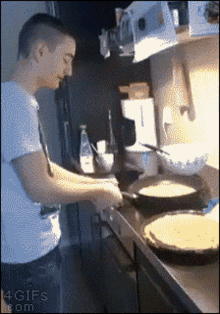
Ping!....................
Think I’ll order the Rachel Corrie Special.
Seems like this should have been part of so-called “Fat Tuesday.” Some folks won’t be eating delicious pancakes for a few more weeks.

Yummy!
I make flapjacks (pancakes) with sourdough discard, about 4 or 5 dozen at a time. They freeze REALLY well.
Added sugar, extra eggs, vanilla, blueberries, and chocolate and vanilla chips make them more like muffins but everybody loves them, and they don’t even need syrup.
Fry them up in coconut oil.
Not a fluffy and foamy pancake like you get at the Pancake House. Just better.
Cheers!
I can’t recall ever hearing anyone in real life refer to a pancake as a flapjack. Only in fictional Westerns and such.
But I love pancakes, especially sourdough.
I worked one summer at “the pancake resteraunt “ and we made 45 different pancake combos- plus folks could request combos that weren’t on the list. Some of the combos were pretty wild, like lobster, class and blueberries, scallops and shrimp, some would request veggies be mixed in- the place was almost always packed.
Then I went to work at “the omellette factory”, a tiny little resteraunt that also was always packed, as their 40± varieties of omelets was massive as well. Both places were gold mines for their owners. I’d get to work in the morning gbefore we opened and people were already lined up outside waiting to get their breakfast.
If anyone gets out to Ogunquit maine, look for the omelets factory for a great breakfast!
https://www.omelettefactoryme.com/
“Jack” is a bit trickier. It’s likely a generic stand-in, common in English for tools or everyday objects (e.g., “jackknife,” “lumberjack”). It might also nod to jakke, an old term for a simple dish or a person (like “every man’s jack”), making “flapjack” a humble, everyman’s flatbread.
"Flapjack" first popped up in print around 1553, in a dictionary by Richard Huloet, as “flapjacke,” meaning a flat cake or tart. By 1600, it’s in Shakespeare’s Pericles, Prince of Tyre (Act II, Scene 1): “Come, thou shalt go home, and we’ll have flesh for holidays, fish for fasting-days, and moreo’er puddings and flapjacks.” Here, it’s a treat—likely a baked flatbread or early pancake, not quite the modern fluffy stack. Back then, it wasn’t strictly our pancake. It could mean anything flat and fried or baked—apple tarts, oatcakes, or dough slapped on a griddle.
By the 18th century, “flapjack” narrowed to something closer to today’s meaning: a batter-based cake cooked on a flat surface and flipped. English cookbooks—like Hannah Glasse’s The Art of Cookery (1747)—start linking it to griddlecakes, though recipes vary (some with fruit, some plain).
The “flap” action—flipping it mid-cook—becomes key. It’s distinct from “pancake” (from “pan” + “cake,” broader and older), emphasizing the flipper’s skill.
In the U.S., “flapjack” is a casual synonym for “pancake”—big, round, fluffy, stacked with syrup. But in the UK, it diverges: by the 1900s, “flapjack” often means a chewy oat bar, baked and cut into squares, leaving “pancake” for the griddle version. The old “flat cake” sense morphs with local tastes.
I've never been able to master the flipping of a flapjack in the pan. I always use a boring and uninteresting spatula. I learned my lesson the last time I tried flipping my flapjack.

1960s origins of McDonald’s Filet o’ Fish trace back to Catholic customers in Cincinatti…